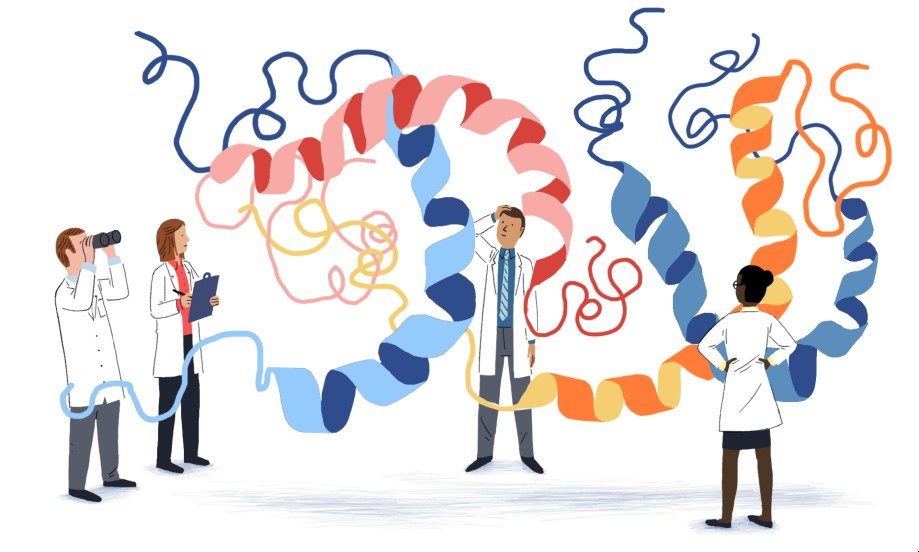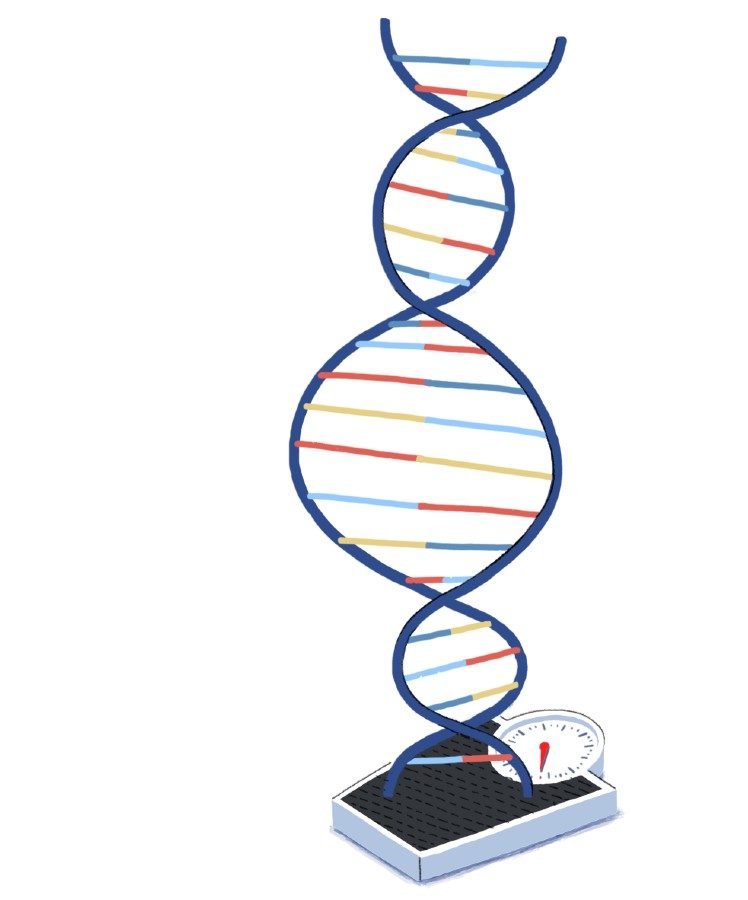
Campendium: Lent Term 2019
A £100 million gift; alumni benefits; and the largest-ever study on genetics and weight gain
A Cambridge Guide To… Proteomics
Proteomics is the large-scale study of proteins and their role in living cells and organisms. Understanding how proteins work is key to answering vital questions about how biological systems function: how our body’s cells respond to drug treatment, for example.
But these complex compounds require a great deal of expertise and expensive equipment to study effectively. Now, the University has joined the European Proteomics Initiative Consortium (EPIC-XS), made up of 18 research groups, which has just received a €10m research grant from the EU.
This kind of international collaboration is essential, says Kathryn Lilley, head of the Cambridge Centre for Proteomics (CCP).
“There is a vast array of proteomics methods and each laboratory can only become expert in a subset of these,” she says. “By working together, we can finesse our methodologies to uncover important cellular processes inaccessible with current approaches.”
Find out more about proteomics.

Beer Before Wine And You’ll Feel Fine
Or not. Research has found that drinking beer before wine still results in a hangover. But there is an upside, says Senior Clinical Fellow Dr Kai Hensel:
“Unpleasant as hangovers are, they do have one important benefit: they are a protective warning sign that will have aided humans over the ages to change their future behaviour. In other words, they can help us learn from our mistakes.”
Philanthropy: Biggest single gift to fund students
The David and Claudia Harding Foundation has given £100m to the Collegiate University to help attract the most talented postgraduate and undergraduate students from the UK and around the world.
It is the biggest single gift to a UK university by a British donor and will fund two key areas of student support.
The Harding Distinguished Postgraduate Scholars Programme will provide fully funded scholarships, enabling the University to attract the most talented PhD students, whatever their circumstances.
“We want to attract, support and fund the most talented students we can find from all parts of the UK and the world.”
The Harding Collegiate Cambridge Challenge Fund will support undergraduates, and a further sum has been set aside to stimulate innovative approaches to attracting undergraduate students from under-represented groups.
Professor Stephen J Toope, Vice- Chancellor, said: “This extraordinarily generous gift will be invaluable in sustaining Cambridge’s place among the world’s leading universities and will help to transform our offer to students. We want to attract, support and fund the most talented students we can find from all parts of the UK and the world.”
“We are determined that Cambridge should nurture the finest academic talent, whatever the background or means of our students, to help us fulfil our mission ‘to contribute to society through the pursuit of education, learning and research at the highest international levels of excellence’.
In October 2018, Professor Toope announced the Student Support Initiative (SSI), focused on: postgraduate studentships; undergraduate financial support and widening participation; and student wellbeing, sport and cultural activities.
5
Five members of Collegiate Cambridge were recognised in the 2019 New Year honours list: Professor David Klenerman was knighted; Professor Madeleine Atkins was made a DBE; Professor John (Ewan) Birney was made a CBE; and Dr Jennifer Schooling and Andrew Nairne were awarded OBEs.

Two-minute Tripos: Slimming and Genetics
I’ve tried 5:2, the cabbage soup diet, Atkins, Weight Watchers, SlimFast, and that one where those celebrities lived on maple syrup and baby food. But I haven’t lost any weight. Why?
You know the old saying: eat less, move more. It works for me. Burger?
But look at you, with tomato ketchup all over your chin. Your only regular exercise is opening the fridge door.
Nonsense. I am clearly just a better person than you. I obviously just have more willpower than you. Hobnob?
So you’re saying that even though I spent nine weeks eating nothing but cabbage soup, I have no willpower? Hand me the cake now.
Well, I suppose genetics could be a thing. Full-fat cola, anyone?
Actually, according to the Study Into Lean and Thin Subjects (STILTS) at the Wellcome-MRC Institute of Metabolic Science and the largest ever study into the subject, that may well be why some people find it easier to stay thin than others.
Largest study, ha ha ha!
Oh, put a doughnut in it. The researchers found several common genetic variants already identified as playing a role in obesity. And they found new genetic regions involved in severe obesity and healthy thinness.
Just sounds like another excuse to me. The obvious conclusion is that most people just don’t have my self-control.
Hmm. I’m with Professor Sadaf Farooqi, who led the study. She said: “This research shows for the first time that healthy thin people are generally thin because they have a lower burden of genes that increase a person’s chances of being overweight – and not because they are morally superior, as some people like to suggest.”
Mine’s a knickerbocker glory. With extra cream.
Find out more about slimming and genetics.
New city? New sector? No problem
From Northallerton to North America and from Brighton to Bangalore, the University and Colleges’ 442 (and counting) groups offer networking opportunities, hospitality and friendship, and are open to all alumni.
Supported by the University’s Alumni Office and by College Development Offices, groups range from those focused on particular industries and interests – such as the Cambridge Alumni Arbitration Law Association, CAMentrepreneurs and the Motorcycle Association – to those for a particular city, region or country, such as Cambridge Alumni in Mauritius and the Lancashire Cambridge Society.
Joint Oxford-Cambridge groups, such as the Oxford and Cambridge Society UAE or the Oxford and Cambridge Society of Toronto, thrive in many places around the world. And for those just 10 years out, Cambridge10 runs London events for new graduates and young professionals.
Every group is different, taking in the solo local organiser and the large committee, and what they get up to varies too: from monthly pub nights to networking and careers events, talks and lectures from guest speakers, events to celebrate the Boat Races and annual gatherings and dinners.
And don’t forget that alumni groups are just one of the many benefits the University’s alumni office provides for graduates.
Read more about Alumni groups.
New Heads of House
The current British Ambassador to Belgium, Alison Rose (Newnham 1980), has been chosen by the Fellows of Newnham as their new Principal-elect. Rose will join Newnham in September.
Trinity has announced that its next Master will be Professor Dame Sally Davies, currently Chief Medical Adviser to the UK government. Dame Sally will be installed in October.







